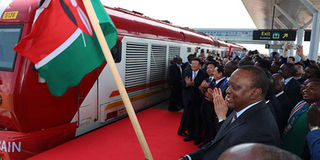Early handover of SGR stalls as Chinese firm refuses to play ball

President Uhuru Kenyatta flags off the first freight train connecting Nairobi to Naivasha inland container depot at the Nairobi SGR terminus. PHOTO | FILE | PSCU
What you need to know:
- Afristar which was formed in May 2017 just weeks to the launch of the Madaraka Express, is supposed to run the SGR till 2027.
- The contract is, however, lopsided as it freed the operator of all liabilities and forces Kenya Railways to pay a fixed monthly service charge – which must be paid quarterly and in advance.
- Consequently, the Kenyan government has been quietly pushing for the operations of the project to be handed over to Kenya Railways by 2022 and preparations for the hand over to begin before the end of 2020.
A push for an early handover of the operations of the Standard Gauge Railway (SGR) appears set to stall as Kenya Railways and Afristar, the Chinese company appointed to run the project, are not reading from the same script.
Afristar which was formed in May 2017 just weeks to the launch of the Madaraka Express, is supposed to run the SGR till 2027. The contract is, however, lopsided as it freed the operator of all liabilities and forces Kenya Railways to pay a fixed monthly service charge – which must be paid quarterly and in advance.
Consequently, the Kenyan government has been quietly pushing for the operations of the project to be handed over to Kenya Railways by 2022 and preparations for the hand over to begin before the end of 2020.
And on its part, Kenya Railways has for the past one year been attempting to bring the Chinese to the negotiating table to talk on how to reduce the operation costs of the SGR. Sources have told the Nation that some influential people holding brief for Chinese wheeler-dealers appear hell bent on stalling the process.
This has left the Kenyan government frustrated on how it will get itself out of a lopsided contract that is costing taxpayers at least Sh1.5 billion a month for a mega project that is yet to break even and is still far from turning a profit.
Sources aware of the affairs within Kenya’s largest infrastructure project say that the relationship between Kenya Railways and Afristar started deteriorating after the State Law Office advised KR not to extend the operation contract for the Nairobi Suswa SGR leg.
That was in April and Kenya was one month into the coronavirus pandemic. The SGR had halted passenger services and even worse the Nairobi Suswa route which was launched in October last year was still doing badly.
Afristar had asked for a further three months to operate the route, but it could not reach a consensus with Kenya Railways on how to reduce operation costs for the entire project.
When information about this deadlock reached the State Law Office, Solicitor General Ken Ogeto adviced Kenya Railways to terminate its contract with Afristar on the operations of the Nairobi-Suswa leg of the project altogether.
“It does not make any economic sense for Kenya Railways to extend the addendum for Phase 2A for a further period of three months as the same invites an additional financial liability attributable to such operations that are not economically sustainable,” Mr Ogeto told Kenya Railways in a letter on April 15.
Afristar is a subsidiary of China Road and Bridges Corporation (CRBC), the company that was during the final year of retired President Mwai Kibaki’s term in 2012 awarded a Sh427 billion contract to construct the Nairobi-Mombasa leg of the SGR.
The manner in which the contract was awarded was last week declared by the Court of Appeal as having failed to follow procurement laws.
But even as the government appeals the judgement at the Supreme Court, it could also be on the brink of another long and bitter war as it pushes to have its pet SGR project handed over to it by June 2022. As it stands, Afristar has indicated it is unwilling to play ball.
But in case the Chinese company agrees to handover the railway to the government, Kenya Railways will be required to pay six months’ worth of the fixed costs payable to Afristar and all pending bills. It appears that this is a financial risk that the government is willing to take in order to save face and reduce the financial burden of running the SGR.
Last year, the SGR raked in Sh13 billion, leaving taxpayers with a shortfall of Sh5 billion. Taxpayers are supposed to repay at least Sh50 billion of the Sh324 billion borrowed from the China Exim bank for construction of the first phase of the SGR by the end of 2020. This amount is supposed to be repaid annually until the loan is completed.
When contacted, the Chinese company refused to divulge to the Nation how much it is earning from taxpayers on a monthly basis.
When contacted about these developments Kenya Railways Managing Director Philip Mainga refused to comment.
“We will give an official response in the course of the week,” he said.





